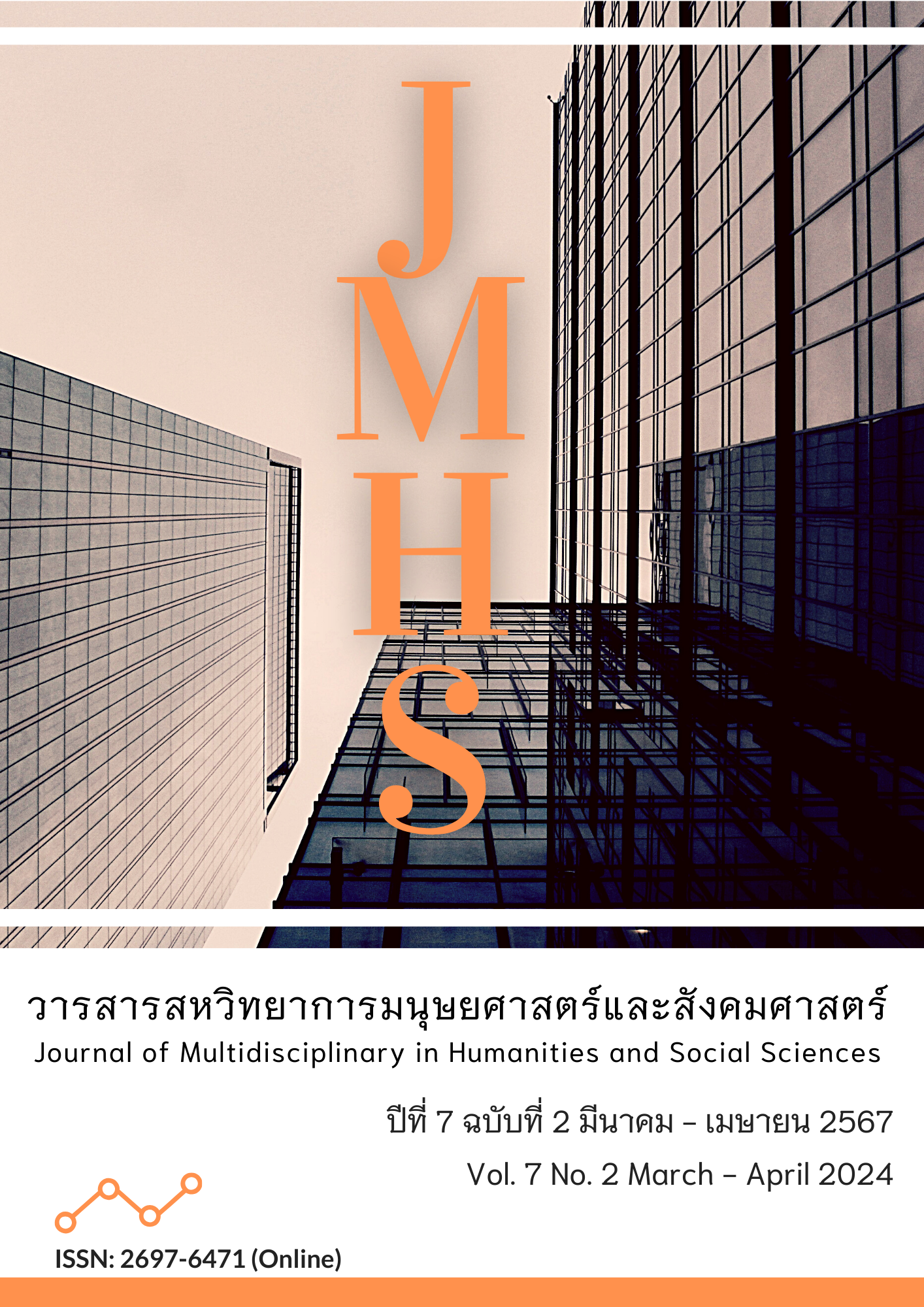แนวทางการพัฒนาหลักสูตรบริหารธุรกิจบัณฑิต สาขาการตลาดและการสร้างแบรนด์บุคคลในระดับการศึกษาปริญญาตรี
Main Article Content
บทคัดย่อ
บทความนี้มีวัตถุประสงค์เพื่อ 1) ศึกษาความต้องการในการพัฒนาหลักสูตร 2) คุณลักษณะและทักษะที่จำเป็นของบัณฑิต และ 3) แนวทางการพัฒนาหลักสูตรบัณฑิตสาขาการตลาดและการสร้างแบรนด์บุคคล ในระดับการศึกษาปริญญาตรี เป็นการวิจัยเชิงพรรณนา ใช้ระเบียบวิธีการวิจัยแบบผสม โดยการเก็บข้อมูลจากผู้มีส่วนได้ส่วนเสีย ใช้แบบสอบถามและการสัมภาษณ์เชิงลึก พร้อมตรวจสอบความถูกต้องของข้อมูลก่อนทำการวิเคราะห์ด้วยสถิติพรรณนา การวิเคราะห์เนื้อหา
การวิเคราะห์ข้อมูลเชิงคุณภาพ และบูรณาการข้อมูล ผลการวิจัยพบว่า 1) หลักสูตรใหม่ต้องเน้นการลงมือปฏิบัติจริง สามารถเรียนผ่านระบบออนไลน์ สอนเรื่องการวางตัวที่เหมาะสมกับวิชาชีพถูกกาลเทศะ และส่งเสริมการมีมนุษยสัมพันธ์และการควบคุมอารมณ์ 2) หลักสูตรใหม่ต้องพัฒนาคุณลักษณะ มีความสามารถในการสร้างสรรค์ มีความรับผิดชอบ ความอดทน บุคลิกภาพดี ความสามารถในการปรับตัวในสถานการณ์ต่าง ๆ มีความต้องการรู้และเรียนรู้สิ่งใหม่อยู่เสมอ มีความคิดเชิงวิเคราะห์ และทักษะความรู้ด้านดิจิทัล ทักษะความร่วมมือ ทักษะในการสื่อสาร ทักษะในการวิจัยตลาดอย่างมืออาชีพ ทักษะการประเมินสิ่งแวดล้อม และ 3) หลักสูตรบัณฑิตสาขาการตลาดและการสร้างแบรนด์บุคคล ต้องมีแนวทางการพัฒนาผู้เรียนให้คำนึงถึงความยั่งยืนและมีจริยธรรม มีความรู้สามารถในการจับใจความ ขยายความ ตีความ และสรุปความ มีความเป็นนักวิเคราะห์ที่สามารถปรับตัวเข้ากับสถานการณ์ มีการทำงานเป็นทีม สามารถถ่ายทอดข้อมูลข่าวสาร และการควบคุมอารมณ์เกิดการเปลี่ยนแปลงความเป็นตัวตน
Article Details

อนุญาตภายใต้เงื่อนไข Creative Commons Attribution-NonCommercial-NoDerivatives 4.0 International License.
ทัศนะและความคิดเห็นที่ปรากฏในวารสาร ถือเป็นความรับผิดชอบของผู้เขียนบทความนั้น และไม่ถือเป็นทัศนะและความรับผิดชอบของกองบรรณาธิการ
เอกสารอ้างอิง
กรมการจัดหางาน. (2565). รายงานผลการศึกษาวิจัย ทิศทางตลาดแรงงานไทยในอนาคต. กองบริหารข้อมูลตลาดแรงงาน กรมการจัดหางาน. สืบค้นเมื่อ 17 เมษายน 2566, จาก https://www.doe.go.th/prd/assets/upload/files/lmia_th/1518f36b23b0da4e6a26fb1a5ae262d6.pdf
เกียรติพงษ์ อุดมธนะธีระ. (2560, 11 พฤษภาคม). SDG เป้าหมายการพัฒนาที่ยั่งยืนขององค์การสหประชาชาติ (UN Sustainable Development Goals, SDGs). สืบค้นเมื่อ 17 เมษายน 2566,จาก https://www.iok2u.com/article/strategic-plan/un-sustainable-development-goals-sdgs
ชนันภรณ์ อารีกุล. (2562). การศึกษาทางเลือก: รูปแบบการเรียนรู้ที่สำคัญสำหรับเจเนอเรชั่นแอลฟา. วารสาร มจร. สังคมศาสตร์ปริทรรศน์, 8(3), 270-283.
แผนพัฒนาเศรษฐกิจและสังคมแห่งชาติ ฉบับที่สิบสาม พ.ศ. 2566 – 2570. (2565, 1 พฤศจิกายน). ราชกิจจานุเบกษา. เล่ม 139 ตอนพิเศษ 258 ง.
ไพศาล คงสถิตสถาพร. (2566, 2 มิถุนายน). ทิศทางของมหาวิทยาลัยสวนดุสิต: จิ๋ว แต่ แจ๋ว (ฉบับทบทวน) พ.ศ. 2566-2567. (SDU Directions: SMALL but SMART (Revised version) 2023-2024) สืบค้นเมื่อ 17 เมษายน 2566. จาก https://www.dusit.ac.th/home/2023/1103420.html
มารุต พัฒผล. (2562). แนวคิดหลักการพัฒนาหลักสูตร. กรุงเทพฯ. ศูนย์ผู้นำนวัตกรรมหลักสูตรและการเรียนรู้.
โยธิน แสวงดี. (2558). ระเบียบวิธีการวิจัยแบบผสม. สถาบันวิจัยประชากรและสังคม มหาวิทยาลัยมหิดล. สืบค้นเมื่อ 20 พฤษภาคม 2565, จาก http://www.thaivbd.org/n/researchs/download/238
สกล ธีระวรัญญู. (2562, 12 มิถุนายน). การประเมินผลลัพธ์การเรียนรู้ตามทฤษฎีของบลูม (Bloom’s Taxonomy). สืบค้นเมื่อ 17 เมษายน 2566, จาก https://li.kmutt.ac.th/knowledge/bloom-taxonomy/
สาโรช บัวศรี. (2549). การศึกษาและจริยธรรม. กรุงเทพฯ: กริดส์ ดีไซน์ แอนด์ คอมมูนิเคชั่น.
สุธิดา วัฒนยืนยง อัปสร อีซอ และปวีณา เจะอารง. (2557). อัตลักษณ์หลักสูตรบริหารธุรกิจบัณฑิต สาขาวิชาการตลาด คณะวิทยาการจัดการ มหาวิทยาลัยราชภัฏ
ยะลา. รายงานวิจัยฉบับสมบูรณ์. วิทยาการจัดการ มหาวิทยาลัยราชภัฏยะลา.
สำนักงานสภาพัฒนาการเศรษฐกิจและสังคมแห่งชาติ. (2562). ยุทธศาสตร์ชาติ พ.ศ. 2561-2580 (ฉบับย่อ). สืบค้นเมื่อ 17 เมษายน 2566, จาก https://www.nesdc.go.th/download/document/SAC/NS_SumPlanOct2018.pdf
อโณทัย งามวิชัยกิจ. (2564). วิจัยการตลาด. (พิมพ์ครั้งที่ 2). นนทบุรี: ธนาเพรส.
HREX.asia. (2563, 5 สิงหาคม). เรียนรู้เจนเนอร์เรชั่นอัลฟา (Gen Alpha) เพื่อเตรียมรับมือกับตลาดแรงงานในอนาคต. สืบค้นเมื่อ 17 เมษายน 2566, จาก https://th.hrnote.asia/tips/190805-generation-alpha/
Bachri, B.S. (2018). Curriculum Development and Implementation on Higher Education in Indonesia. In Conference: Proceedings of the 2nd International Conference on Education Innovation (ICEI 2018). 496-498. DOI:10.2991/icei-18.2018.106
Fagrell, P., Fahlgren, A., & Gunnarsson, S. (2020). Curriculum development and quality work in higher education in Sweden: The external stakeholder perspective. Journal of Praxis in Higher Education, 2(1), 2-19. DOI:10.47989/kpdc62
Kılıç, F., & Saygılı, S. (2022). New Normal: The Future Curriculum Development in Education. Education Quarterly Reviews, 5(2), 202-215.
Li, L., Huang, F., Chen, S., Pan, L., Zeng, W., & Wu, X. (2020). Exploring the curriculum development in content and language integrated
learning: A systematic review. International Journal of Evaluation and Research in Education (IJERE), 9(4), 1102-1113. DOI:10.11591/ijere.v9i4.20705


